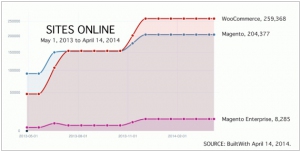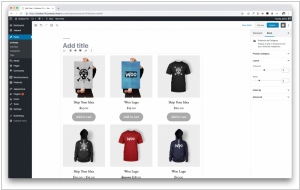Magento vs WooCommerce
July 28, 2023 | Author: Sandeep Sharma
Magento and WooCommerce are two popular e-commerce platforms that cater to businesses of various sizes and needs. Magento is a robust, feature-rich platform suitable for larger enterprises and businesses with complex e-commerce requirements. It offers extensive customization options, scalability, and a wide range of functionalities, making it ideal for businesses that need complete control over their online store's design and performance. On the other hand, WooCommerce is a plugin built specifically for WordPress, making it a suitable choice for small to medium-sized businesses and entrepreneurs already using WordPress for their websites. WooCommerce seamlessly integrates with WordPress, providing users with a user-friendly interface and a wide range of plugins and themes to enhance their online store's functionality and appearance. While Magento is known for its power and flexibility, WooCommerce stands out for its simplicity, ease of use, and compatibility with the WordPress ecosystem.
See also: Top 10 Online Store Builders
See also: Top 10 Online Store Builders
Magento vs WooCommerce in our news:
2020. WooCommerce launches native WooCommerce Payments feature

The e-commerce platform WooCommerce, created by Automattic, is enhancing its payment functionality with a native solution known as WooCommerce Payments. This payment feature is powered by Stripe and offers seamless integration with the rest of the WooCommerce platform. In the past, WooCommerce users had the option to enable extensions to incorporate payment widgets on their websites, including providers like Stripe, Amazon Pay, Square, or PayPal. However, WooCommerce Payments takes this capability a step further by simplifying the setup process and facilitating order acceptance, providing an effortless experience for merchants.
2018. Adobe acquires open-source e-commerce CMS Magento

After acquiring the market-leading eCommerce platform Magento for $1.68 billion, Adobe secured a foothold in the realm of Cloud Computing. With this purchase, Adobe now possesses an eCommerce platform that complements their existing commerce offerings, enabling a complete commerce loop. Furthermore, this acquisition enables Adobe to cater to both B2B and B2C customers on a global scale. Following the acquisition, Magento launched Magento Commerce Cloud in 2016, which offers a content delivery network and is considered a more expensive option compared to the Magento Commerce On-premise platform. As a leader in cloud commerce innovation for merchants, B2B, and B2C companies, Magento Commerce remains at the forefront of the industry. Notably, Magento's open-source platform will continue to be available for small businesses, providing limited functionalities and being free to use.
2014. WooCommerce outgoes Magento in Ecommerce Platform Pack

According to BuiltWith, a web technology profiling tool, WooCommerce, the widely-used WordPress ecommerce plugin, boasts nearly 260,000 active sites indexed, surpassing its closest competitor, Magento, by approximately 37,000 sites. The remarkable number of websites powered by WooCommerce can be attributed, at least in part, to the immense popularity of the WordPress content management software, which serves as the foundation for WooCommerce. With WordPress being estimated to support over 12.3 million websites globally, it has solidified its position as one of the most widely utilized web publishing platforms available. Furthermore, WordPress enjoys extensive documentation and widespread understanding within the development community, making the integration of ecommerce capabilities through WooCommerce a relatively straightforward and manageable endeavor.




